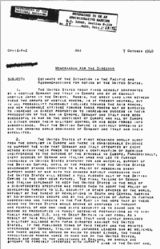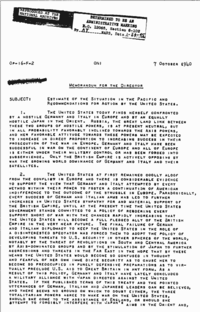
McCollum memo
Encyclopedia

Memorandum
A memorandum is from the Latin verbal phrase memorandum est, the gerundive form of the verb memoro, "to mention, call to mind, recount, relate", which means "It must be remembered ..."...
, dated October 7, 1940 (more than a year before the Pearl Harbor attack, sent by Lieutenant Commander Arthur H. McCollum, who "provided the president with intelligence reports on [Japan]... [and oversaw] every intercepted and decoded Japanese military and diplomatic report destined for the White House") in his capacity as director of the Office of Naval Intelligence
Office of Naval Intelligence
The Office of Naval Intelligence was established in the United States Navy in 1882. ONI was established to "seek out and report" on the advancements in other nations' navies. Its headquarters are at the National Maritime Intelligence Center in Suitland, Maryland...
's Far East Asia section. It was sent to Navy Captains Dudley Knox, who agreed with the actions described within the memo, and Walter Stratton Anderson
Walter Stratton Anderson
Walter Stratton Anderson was an Vice Admiral of the United States Navy, who served as the Executive officer of in World War I and as Commander of Battleships, Pacific Fleet, and of the Gulf Sea Frontier, during World War II.-Biography:...
.
The memo outlined the general situation of several nations in World War II
World War II
World War II, or the Second World War , was a global conflict lasting from 1939 to 1945, involving most of the world's nations—including all of the great powers—eventually forming two opposing military alliances: the Allies and the Axis...
and recommended an eight-part course of action for the United States
United States
The United States of America is a federal constitutional republic comprising fifty states and a federal district...
to take in regards to the Japanese Empire in the South Pacific, suggesting the United States provoke Japan into committing an "overt act
Overt Act
In criminal law, an overt act , an open act, one that can be clearly proved by evidence, and from which criminal intent can be inferred, as opposed to a mere intention in the mind to commit a crime...
of war".The memo illustrates several people in the Office of Naval Intelligence
Office of Naval Intelligence
The Office of Naval Intelligence was established in the United States Navy in 1882. ONI was established to "seek out and report" on the advancements in other nations' navies. Its headquarters are at the National Maritime Intelligence Center in Suitland, Maryland...
promoted the idea of goading Japan into war: "It is not believed that in the present state of political opinion the United States government is capable of declaring war against Japan without more ado [...] If by [the elucidated eight-point plan] Japan could be led to commit an overt act of war, so much the better."
The McCollum memo was first widely disseminated with the publication of Robert Stinnett
Robert Stinnett
Robert B. Stinnett is a former American sailor who earned ten battle stars and a Presidential Unit Citation. He is the author of Day of Deceit, regarding U.S. government advance knowledge of the World War II Pearl Harbor attack.-Biography:...
's book Day of Deceit: The Truth About FDR and Pearl Harbor
Day of Deceit
Day of Deceit: The Truth About FDR and Pearl Harbor is a book by Robert Stinnett alleging that the Roosevelt administration deliberately provoked and allowed the Japanese attack on Pearl Harbor in order to bring the United States into World War II...
. Stinnett presents the memo as part of his argument the Roosevelt Administration
Franklin D. Roosevelt
Franklin Delano Roosevelt , also known by his initials, FDR, was the 32nd President of the United States and a central figure in world events during the mid-20th century, leading the United States during a time of worldwide economic crisis and world war...
conspired to secretly provoke the Japanese to attack the United States in order to bring the United States into the European war without generating public contempt over broken political promises. Roosevelt had recently issued a campaign promise the United States would not become entangled in Europe's war under his watch. Stinnett omits to mention McCollum never had contact with Roosevelt, and Stinnett's claims to the contrary are false. Moreover, Stinnett attributes to McCollum a position McCollum expressly refuted. McCollum's own sworn testimony also refutes it.
The Eight-Action plan
The McCollum memo contained an eight-part plan to counter rising Japanese power over East Asia:- A. Make an arrangement with Britain for the use of British bases in the Pacific, particularly Singapore
- B. Make an arrangement with Holland for the use of base facilities and acquisition of supplies in the Dutch East Indies
- C. Give all possible aid to the Chinese government of Chiang-Kai-Shek
- D. Send a division of long range heavy cruisers to the Orient, Philippines, or Singapore
- E. Send two divisions of submarines to the Orient
- F. Keep the main strength of the U.S. fleet now in the Pacific[,] in the vicinity of the Hawaiian Islands
- G. Insist that the Dutch refuse to grant Japanese demands for undue economic concessions, particularly oil
- H. Completely embargo all U.S. trade with Japan, in collaboration with a similar embargo imposed by the British Empire
Reception of the Eight Actions
The memo was read and appended by Captain Knox, who, despite being seemingly reluctant to "precipitate anything in the Orient", ultimately concurs. Specifically, he wrote (Page 6):- It is unquestionably to our interest that Britain be not licked - just now she has a stalemate and probably can't do better. We ought to make certain that she at least gets a stalemate. For this she will probably need from us substantial further destroyers and air-reinforcements to England. We should not precipitate anything in the Orient that would hamper our ability to do this - so long as probability continues. If England remains stable, Japan will be cautious in the Orient. Hence our assistance to England in the Atlantic is also protection to her and us in the Orient. However, I concur in your courses of action. We must be ready on both sides and probably strong enough to care for both.
Stinnett writes that while "no specific record has been found by the author indicating whether [Anderson] or Roosevelt actually ever saw it", "a series of secret presidential routing logs plus collateral intelligence information in the Navy files offer conclusive evidence that they did see it". His evidence of "secret presidential routing logs" is not provided. Stinnett goes on to write, "throughout 1941, it seems, provoking Japan into an overt act of war was the principal policy that guided FDR's actions against Japan" and "Roosevelt's cabinet members, most notably Secretary of War Henry L. Stimson
Henry L. Stimson
Henry Lewis Stimson was an American statesman, lawyer and Republican Party politician and spokesman on foreign policy. He twice served as Secretary of War 1911–1913 under Republican William Howard Taft and 1940–1945, under Democrat Franklin D. Roosevelt. In the latter role he was a leading hawk...
, are on record favoring the policy, according to Stimson's diary". Further evidence that suggests Roosevelt had seen the memos was his support of "pop-up" cruises, an elaboration upon Actions D and E of the eight recommended actions detailed in the memo: "I just want them to keep popping up here and there and keep the Japs guessing. I don't mind losing one or two cruisers, but do not take a chance on losing five or six."
Admiral Husband E. Kimmel
Husband E. Kimmel
Husband Edward Kimmel was a four-star admiral in the United States Navy. He served as Commander-in-chief, U.S. Pacific Fleet at the time of the Japanese attack on Pearl Harbor. Because of the attack, he was removed from office and was reduced to his permanent two-star rank of rear admiral...
, on the other hand, opposed the "pop-up" cruises, saying they were "most ill-advised and will result in war if we make this move", but "the decision [on the 'pop-up' cruise matter] may go against me". In fact, at the time, Kimmel did not know of Washington's eight-action policy.
Admiral James O. Richardson also opposed the plan and "quoted the President as saying: 'Sooner or later the Japanese would commit an overt act against the United States and the nation would be willing to enter the war'."
Also, Admiral Nimitz turned down the command of the Pacific Fleet so that he would not become the scapegoat if the Japanese attacked the United States by surprise. In a History Channel interview, Admiral Chester Nimitz Jr. described his father's political maneuver: "He said, 'It is my guess that the Japanese are going to attack us in a surprise attack. There will be a revulsion in the country against all those in command at sea, and they will be replaced by people in positions of prominence ashore, and I want to be ashore, and not at sea, when that happens.'"
The characterization of the McCollum memorandum as a recipe for war was not accepted by U. S. Army military historian Conrad Crane, who wrote:
A close reading shows that its recommendations were supposed to deter and contain Japan, while better preparing the United States for a future conflict in the Pacific. There is an offhand remark that an overt Japanese act of war would make it easier to garner public support for actions against Japan, but the document's intent was not to ensure that event happened.
See also
- Day of Deceit: The Truth About FDR and Pearl HarborDay of DeceitDay of Deceit: The Truth About FDR and Pearl Harbor is a book by Robert Stinnett alleging that the Roosevelt administration deliberately provoked and allowed the Japanese attack on Pearl Harbor in order to bring the United States into World War II...
- Pearl Harbor advance-knowledge debatePearl Harbor advance-knowledge debateThe Pearl Harbor advance-knowledge conspiracy theory is the idea that the American officials had advance knowledge of Japan's December 7, 1941 attack on Pearl Harbor...
- Hull noteHull noteThe Hull note or officially Outline of Proposed Basis for Agreement Between the United States and Japan was the final proposal delivered to the Empire of Japan by the United States before the attack on Pearl Harbor and the declaration of war between the two nations...
External links
- Full Text of McCollum Memo and Knox's Endorsement

